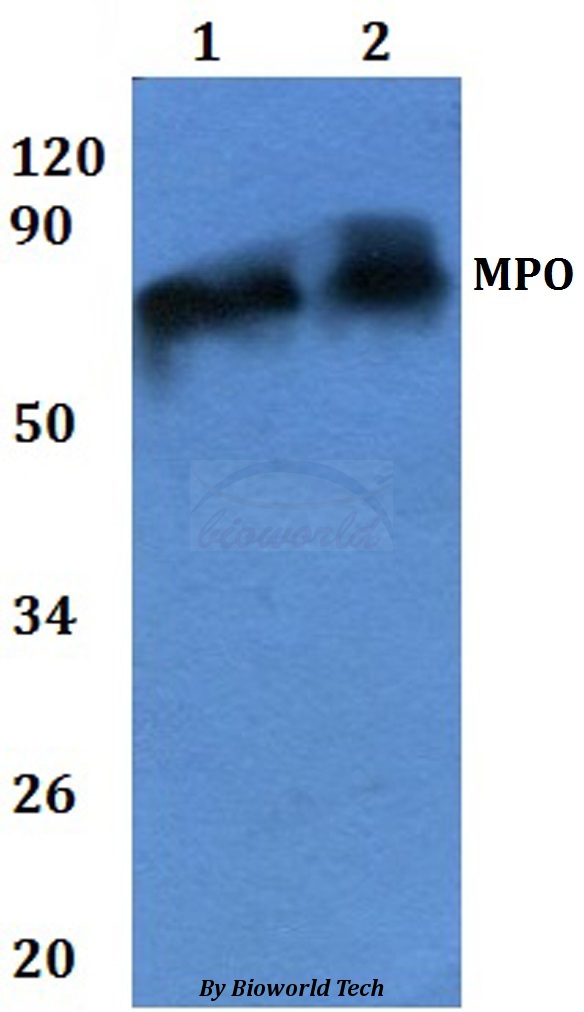Product Name :
MPO polyclonal antibody Background :
The heme protein myeloperoxidase (MPO) is a major component of azurophilic granules of neutrophils and polymorphonuclear leukocytes. Optimal oxygen-dependent microbiocidal activity depends on MPO as the critical enzyme for the generation of hypochlorous acid and other toxic oxygen products. The MPO precursor is synthesized during the promyelocytic stage of myeloid differentiation and is subsequently processed and transported intracellularly to the lysosomes. The precursor undergoes cotranslational N-linked glycosylation to produce a glycoprotein. Glucosidases in the endoplasmic reticulum (ER) or early cis Golgi convert the pro-MPO to a form which is sorted into a prelysosomal compartment, which undergoes final proteolytic maturation to native MPO, a pair of heavy-light protomers. In normal neutrophils, MPO is expressed as a dimer. Calreticulin, a calcium-binding protein residing in the ER, interacts specifically with fully glycosylated apopro-MPO. iMPO mRNA is abundant in human promyelocytic HL-60 and mouse myeloid leukemia NFS-60 cells. MPO is expressed at high levels in circulating neutrophils and monocytes but is not detectable in microglia, brain-specific macrophages or normal brain tissue. Product :
Rabbit IgG, 1mg/ml in PBS with 0.02% sodium azide, 50% glycerol, pH7.2 Storage&Stability :
Store at 4°C short term. Aliquot and store at -20°C long term. Avoid freeze-thaw cycles. Specificity :
MPO polyclonal antibody detects endogenous levels of MPO protein. Immunogen :
A synthetic peptide corresponding to residues in Human MPO. Conjugate :
Unconjugated Modification :
Unmodification
MPO polyclonal antibody Background :
The heme protein myeloperoxidase (MPO) is a major component of azurophilic granules of neutrophils and polymorphonuclear leukocytes. Optimal oxygen-dependent microbiocidal activity depends on MPO as the critical enzyme for the generation of hypochlorous acid and other toxic oxygen products. The MPO precursor is synthesized during the promyelocytic stage of myeloid differentiation and is subsequently processed and transported intracellularly to the lysosomes. The precursor undergoes cotranslational N-linked glycosylation to produce a glycoprotein. Glucosidases in the endoplasmic reticulum (ER) or early cis Golgi convert the pro-MPO to a form which is sorted into a prelysosomal compartment, which undergoes final proteolytic maturation to native MPO, a pair of heavy-light protomers. In normal neutrophils, MPO is expressed as a dimer. Calreticulin, a calcium-binding protein residing in the ER, interacts specifically with fully glycosylated apopro-MPO. iMPO mRNA is abundant in human promyelocytic HL-60 and mouse myeloid leukemia NFS-60 cells. MPO is expressed at high levels in circulating neutrophils and monocytes but is not detectable in microglia, brain-specific macrophages or normal brain tissue. Product :
Rabbit IgG, 1mg/ml in PBS with 0.02% sodium azide, 50% glycerol, pH7.2 Storage&Stability :
Store at 4°C short term. Aliquot and store at -20°C long term. Avoid freeze-thaw cycles. Specificity :
MPO polyclonal antibody detects endogenous levels of MPO protein. Immunogen :
A synthetic peptide corresponding to residues in Human MPO. Conjugate :
Unconjugated Modification :
Unmodification
-
 Western blot (WB) analysis of MPO polyclonal antibody at 1:500 dilution Lane1:HEK293T whole cell lysate Lane2:RAW264.7 whole cell lysate
Western blot (WB) analysis of MPO polyclonal antibody at 1:500 dilution Lane1:HEK293T whole cell lysate Lane2:RAW264.7 whole cell lysate
Bioworld Biotech only provide peptides for our antibodies and do not provide additional peptide customization services.
Price/Size :
USD 368/1mg/vial
Tips:
For phospho antibody, we provide phospho peptide(0.5mg) and non-phospho peptide(0.5mg).Describe :
Blocking peptides are peptides that bind specifically to the target antibody and block antibody binding. These peptide usually contains the epitope recognized by the antibody. Antibodies bound to the blocking peptide no longer bind to the epitope on the target protein. This mechanism is useful when non-specific binding is an issue, for example, in Western blotting (WB) and Immunohistochemistry (IHC). By comparing the staining from the blocked antibody versus the antibody alone, one can see which staining is specific; Specific binding will be absent from the western blot or IHC performed with the neutralized antibody.Formula:
Synthetic peptide was lyophilized with 100% acetonitrile and is supplied as a powder. Reconstitute with 0.1 ml DI water for a final concentration of 10 mg/ml.The purity is >90%,tested by HPLC and MS.
Storage:
The freeze-dried powder is more stable. For short time at 2-8°C. For long term storage store at -20°C.
Note :
This product is for research use only (RUO only). Not for use in diagnostic or therapeutic procedures.
 MPO polyclonal antibody
MPO polyclonal antibody  Datasheet
Datasheet COA
COA MSDS
MSDS SHIP
SHIP